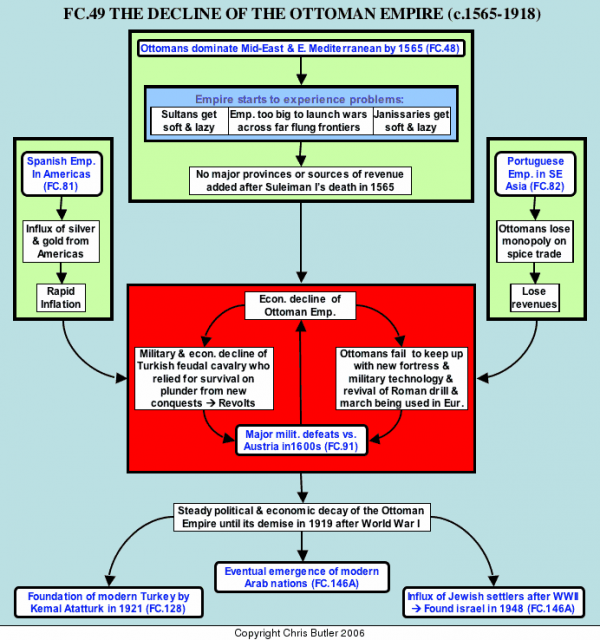In the book Ataturk: rebirth of a nation by Patrick Kinross, the author makes a lot of statements to the effect that Islam was holding Turkey back, that the country was dead, there was no life, no colour, no spark of energy, and that the way of thinking was imprecise and oriental. It also makes a lot of comments about the whiteness of Ataturks skin and his affinity for the west, as if that somehow explains why he was different to the others (and, it is implied, superior). To me, these sound like nothing other than outdated prejudices (the book was published in 1964) and there is nothing in the text to back them up; they are simple unsourced assertions without any supporting evidence.
There are also comments about the superiority of the Christian countries of the west. While the western countries were indeed Christian, I dont think that had anything to do with their success. I think their success was much more down to competition between a large number of states, diversity of competing nations and different forms of government such as city states, republics, monarchies and empires, and the influence of the reformation. It may also have been partly down to luck of geography, since the discovery of the new world benefitted Europes economies enormously and altered global trade routes, markets and currencies in their favour, while disadvantaging those regions left out. Inflation caused by new world gold and silver is one example of this, since it would have driven up prices in global markets, but since the Ottomans and others didnt have access to the gold and silver of the new world the price increases may have hit them harder than the west which had direct access to the precious metals.
The book presents Attaturks fascination with western culture and the impact of attending an Opera as well as western things like waltzes and so on. It also presents a man who identified Islam as the problem holding his country back, and took steps to eliminate it from public life. This included some pretty extreme measures, such as closing down all religious schools and closing down the Sufi lodges, which had existed for a thousand years in some cases. He also abolished the Arabic script and replaced it with the Latin one, cutting the people off from their historical heritage and leaving the country 100% illiterate overnight. In addition, his focus on nationalism seems to have led to problems particularly with the countrys Kurds, which were not integrated and which suffered repression to the present day.
Overall I find Attaturk an impressive and successful historical leader who achieved many remarkable improvements for his country. In general, I agree with the secular principles and also agree that fossilised religious systems that become overly-rigid do indeed inhibit a society. There should be freedom of thought and freedom of opinion. There is a lot of good in the secular values he championed, and it is certainly infinitely preferable to the thuggish barbarism and stupidity, ignorance and greed that characterise the current Erdogan dictatorship in Turkey. Attaturk was vastly better than the leaders Turkey has today.
All of that said though, I wanted to open up some of the more problematic questions for debate. Was Islam really a problem in Turkey at that time? Was it really true that the society was backward because of Islam, or is that simply incorrect? Were other economic, political and cultural factors more accurately to blame? Did Attaturks reforms and in particular his curtailing Islam go too far? Could it even be argued that by weakening the Sufi orders, he inadvertently created the conditions for the very ignorant, uneducated and extreme Islamic backlash that we see today, with Erdogan and his right-wing so-called Islamic policies? If the Sufi orders still existed as they had done before Attaturk closed them down, perhaps the people would have been better educated about Islam in the first place and therefore less susceptible to those criminals who seek to use it as a cloak to hide their authoritarian semi-fascist policies? (Erdogan, looking at you).
Needless to say, Im not interested in this becoming yet another thread derailed by people posting arguments about the merits of Islam itself, quotations from the Quran, right wing fascist comments about immigration to Europe or other totally unrelated subjects. If you want to talk about those, go away and post in the politics forum, where that stuff belongs. No, what I want here is an intelligent discussion for members especially such as Abdulmecid I and Roma Victrix and many others who are impressively knowledgeable about these things.
Was Ottoman society held back by Islam? Or did Ataturk simply find something convenient to blame?
Thanks








 Reply With Quote
Reply With Quote































